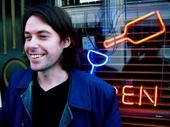'<[i>Last Night, as I was Wandering] is a purgatorial stripmall facade of Nightown, populated by ghosts who walk: Kelly, Kavanagh, Behan, Dylan, MacGowan, the brothers Palace and Louvin and James Clarence Mangan...here's a body of song which understands that any port town is also a portal town, a hell door that admits all manner of strange sailors, strumpets and shape shifters.' Hot Press
'Timeless ballads from the dark side...the lyrics reveal a finely honed literary sensibility' Evening Herald
'You could imagine Shane MacGowan or Luke Kelly blasting out these songs and if that's not a recommendation, we don't know what is' RTE Guide
'As Tom Waits can pull off the adoption of a range of whiskey-soaked characters of all ages, so can McCormack.' Capital Magazine
'McCormack sings with a voice beyond his years... he pulls you into the story; and when you come out the other side, your emotions are scrubbed raw. Since Luke Kelly, this town has not produced many singers who do it so well.' Foggy Notions
Jubilee Allstars, Barry's former band, were once aptly described as equal parts Velvet Underground, Leonard Cohen and Brendan Behan; the records Barry contributed to before leaving the band were influenced by, and showed the influence of, the Irish song and literary traditions and American roots and punk rock.
It was the former influences that were brought to the fore on Barry's debut solo album We Drank Our Tears (2003), which was critically lauded for eschewing the introspective, soul searching approach of most singer-songwriters in favour of songs inspired by the Irish storytelling tradition. Hot Press magazine called it 'A melting pot of Brendan Behan, Bob Dylan and Shane MacGowan...McCormack has created an album of contemporary folk songs rooted in a tradition that goes back generations.'
Perhaps ironically, it was encounters Barry had with American musicians, touring as support with acts like The Handsome Family, Adam Snyder and Joe Pernice, that made him eager to explore the song tradition of his own country, just as Americans have been doing for years.
The influence of The Dubliners and the Dublin street-singing tradition were apparent on Barry's second record, Last Night, as I was Wandering (2006), as well as his reading of local history. 'His city is a purgatorial stripmall facade of Nightown' said Hot Press, 'populated by ghosts who walk: Kelly, Kavanagh, Behan, Dylan, MacGowan, the brothers Palace and Louvin and James Clarence Mangan.' His hometown had also been the inspiration behind Jubilee Allstars’ second album Lights of the City, which saw the band gaining some renown as Dublin eulogists. Barry penned the title track, which The Guardian described as perhaps the greatest song ever written about urban gentrification.
His latest record Night Visiting (2008) is something of a departure in that the songs take on a rural feel in both setting and story. Inspired by local histories, short stories and folk songs, it is a skewed song cycle of murder ballads and comic story songs, further cementing the songwriter’s reputation as a unique voice in Irish popular music. After years of indolent scrounging, Barry has earned a modest, but honest, living as, amongst other things, a shop assistant (stationery supplies), postboy for a life assurance company, office temp, English language teacher and arts columnist.
Barry self-releases his records on the Hag's Head label.
